|
|
|
Sort Order |
|
|
|
Items / Page
|
|
|
|
|
|
|
| Srl | Item |
| 1 |
ID:
120703
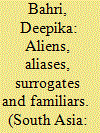

|
|
|
|
|
| Publication |
2013.
|
| Summary/Abstract |
In this essay, I argue that alienation and familiarity serve as mobile matrices for understanding the affectively experienced impact of transnational migration in certain of Jhumpa Lahiri's short stories. While we may think of alienation as a precondition of migrant identity, it is a condition that is familiar to most of us in different contexts. How does alienation, thus plurally conceived, figure in the experience of migrants, producing the relay between heimlich/unheimlich experiences? Moreover, in the socio-cultural context of globalisation, how does transnational migration challenge conventional notions of family, a word associated with notions of familiarity and filiation that are seemingly antonymous to the idea of alienation? These are the questions I set out to answer, concluding that the 'family' is always a unit composed by its very hauntings, surrogates, and absences.
|
|
|
|
|
|
|
|
|
|
|
|
|
|
|
|
| 2 |
ID:
114682
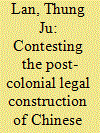

|
|
|
|
|
| Publication |
2012.
|
| Summary/Abstract |
The legal construction of the Chinese Indonesians in post-Independence Indonesia, particularly during Suharto's New Order, is reflected in the so-called SBKRI - Surat Bukti Kewarganegaraan Republik Indonesia (the Republic of Indonesia Citizenship Certificate). The certificate reproduces the colonial racism that divided the population of the Dutch East Indies into three racial categories, namely the Europeans on the top of the ladder, the Foreign Orientals (Chinese, Indian, and Arab) in the middle, and the Inlanders (or natives) at the lower end. In this paper, I problematize the basic principle of the Indonesian Constitution that 'all (Indonesian) citizens have equal rights in the eyes of the law' for the case of Chinese Indonesians. Even though the chapter on citizenship in the 1945 Constitution has been amended twice, I believe the amendment did not correct the racism embedded within.
|
|
|
|
|
|
|
|
|
|
|
|
|
|
|
|
| 3 |
ID:
110766
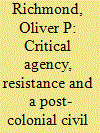

|
|
|
|
|
| Publication |
2011.
|
| Summary/Abstract |
IR's dominant theoretical and methodological approaches are, to varying degrees, compliance oriented. IR needs a theory of resistance if it is to survive its current methodological and ethical crisis. Resistance, read from a broadly Foucaultian perspective, is a process in which hidden, small-scale and marginal agencies have an impact on power, on norms, civil society, the state and the 'international'. This may be in the form of individual or grass-roots critical agency not coordinated or mobilized on a large scale but still globally connected. Such agency is often discursive and aimed at peaceful change and transformation. Through such critical agency a post-colonial civil society has emerged, which is transversal, transnational, fragmented, but may be constitutive of new, hybrid and post-liberal forms of peace.
|
|
|
|
|
|
|
|
|
|
|
|
|
|
|
|
| 4 |
ID:
120741


|
|
|
|
|
| Publication |
2013.
|
| Summary/Abstract |
The aim in this contribution is to amplify the call, articulated across a range of disciplines relevant to international politics, for a paradigm shift that decentres the study and practice of Europe's international relations. Such a perspective is necessary both to make sense of our multipolar order and to reconstitute European agency in a non-European world. The analytical categories proposed in this article for a decentring agenda - provincialization, engagement and reconstruction(s) - can help to navigate the nexus of the empirical and the normative in such a decentring process. Applying the decentring logic to the EU's own foundational narrative, the authors suggest that, only by acknowledging the inflections of colonialism in the EU project itself, can the Union reinvent its normative power in the 21st century.
|
|
|
|
|
|
|
|
|
|
|
|
|
|
|
|
| 5 |
ID:
123071
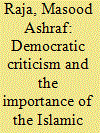

|
|
|
|
|
| Publication |
2013.
|
| Summary/Abstract |
Relying on major debates in reception and reader response theory, this essay attempts to explore the possibilities of reading metropolitan texts about Islam and Islamic culture with an understanding of the Islamic modes of meaning-making and interpretation. Geared toward scholars and students of literature and culture, the essay hopes to foster a more nuanced and complex approach to reading texts that appropriate Islamic raw materials in order to represent a mostly Western poetics and politics.
|
|
|
|
|
|
|
|
|
|
|
|
|
|
|
|
| 6 |
ID:
141084


|
|
|
|
|
| Summary/Abstract |
This paper explores how the government of the People's Republic of China (PRC) has been trying to incorporate post-1997 Hong Kong into the framework of a Greater China. The construction of two ‘narratives’ are examined: the grand narrative of Chinese history in secondary school textbooks in Hong Kong; and the development of a new regional framework of the Pearl River Delta. The first narrative, which focuses on the past, signals the PRC government's desire to inculcate through education a deeper sense of collective identity as patriotic citizens of China amongst residents of Hong Kong. The second narrative, which represents a futuristic imagining of a regional landscape, rewrites the trajectory of Hong Kong by merging the city with the Pearl River Delta region. However, these narrative strategies have triggered ambivalent responses from people in Hong Kong, especially the generations born after 1980. In their discursive battles against merging with the mainland, activists have sought to instil a collective memory that encourages a counter-imagination of a particular kind of Hong Kong that draws from the pre-1997 past. This conflict pits activists and their supporters against officials in the local government working to move Hong Kong towards integration with greater Guangdong and China at large. But the local resistance discourses are inadequate because they are constrained by their own parochial visions and colonial nostalgia.
|
|
|
|
|
|
|
|
|
|
|
|
|
|
|
|
| 7 |
ID:
116597
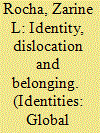

|
|
|
|
|
| Publication |
2012.
|
| Summary/Abstract |
With over 10% of the population identifying with multiple ethnic groups, identities in New Zealand are increasingly complex. This article explores identifications of individuals of mixed Chinese and European descent: the ways in which personal location, classification and race influence feelings of belonging within and between multiple ethnic groups. The fluidity and diversity of the New Zealand context and the resulting positioning of 'mixed race' provide an interesting counterpoint to the comparatively well-studied American and British contexts. Drawing on 20 interviews with individuals of mixed descent, this research highlights how individual identity diverges from official classification and how this dissonance is understood through experiences of dislocation and belonging. 'Mixedness' is negotiated and enacted in many ways, as individuals find ways to belong in the face of wider dislocation, intertwining aspects of heritage, experience, community and nation.
|
|
|
|
|
|
|
|
|
|
|
|
|
|
|
|
| 8 |
ID:
191123
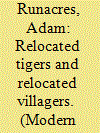

|
|
|
|
|
| Summary/Abstract |
This article will examine state intervention in the lives of tigers and people living in and around Panna Tiger Reserve in Madhya Pradesh, Central India. It explores how, over a decade after a reintroduction project rebuilt the tiger population from extinction and the central government launched a new compensation scheme to relocate villagers away from the national park, relocated tigers and not-yet relocated villagers resist and challenge conservation interventions to eradicate human life in Panna Tiger Reserve and (re)construct it as a wild tiger landscape. It will show how discourses of conservation and development that motivate state intervention seek to depoliticize and obfuscate programmes of control over human and tiger lives through their separation and purported ‘care’, contiguous with colonial policies and discursive practices that have intertwined the fate of wild animals and forest-dependent villagers in this part of India. In their feral subversions against these interventions, relocated tigers and not-yet relocated villagers expose the problematic contradictions and tensions that plague animal management, wildlife conservation, and rural development in India today. Based on 15 months of ethnographic fieldwork, the article draws on case studies and accounts from communities living around Panna Tiger Reserve to present alternatives to colonial and post-colonial discursive legitimizations of state intervention and control, revealing alternate understandings of the entanglement of humans and animals and the categories of ‘wild’ and ‘tame’.
|
|
|
|
|
|
|
|
|
|
|
|
|
|
|
|
| 9 |
ID:
114654


|
|
|
|
|
| Publication |
2012.
|
| Summary/Abstract |
Reviving Ayurveda in post-colonial India has paradoxically been a nationalist venture, where the post-colonial state has restructured traditions, rather than reviving traditional Ayurvedic education, training and apprenticeship. After more than a half century of Indian independence, the majority of Ayurvedic practitioners perceive the impact of British colonial rule negatively, despite the fact that they followed Western methods and frameworks to revive Ayurveda. Today, the training in and research of Ayurvedic education has moved out of the traditional apprenticeship system and into the formal education system. This paper argues that the formalisation and professionalisation of Ayurveda has created an avenue for Ayurvedic graduates to practise backdoor allopathic medicine. Modern-day Ayurvedic practitioners tend to perceive their Ayurvedic training from an allopathic perspective.
|
|
|
|
|
|
|
|
|
|
|
|
|
|
|
|
| 10 |
ID:
117772


|
|
|
|
|
| Publication |
2012.
|
| Summary/Abstract |
If, as Spinoza suggests, sadness is an inadequate idea, how do we account for its mobilization in nationalist and post-colonial critiques of colonialism, neo-colonialism and neo-liberalism? How, in other words, might we see in the inadequate idea of sadness the very conditions for thinking our way into a discussion of political subjectivity that loosens the grip of biopolitics on African subjectivity? Drawing on aesthetic practices of art and film, this article argues that a fundamental shift is discernable in the careful ways in which the affect of sadness has been worked over by artists and filmmakers in Africa. This is a site of productive reworking, which not only eclipses the exhausted political sphere in Africa, but offers ways to theorize its reconstitution. To this end, the article asks that we attend to the ways in which potentiality and impotentiality are rendered as central premises for tackling the question of the renewal of political subjectivity in Africa.
|
|
|
|
|
|
|
|
|
|
|
|
|
|
|
|
|
|
|
|
|